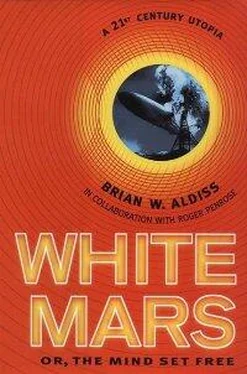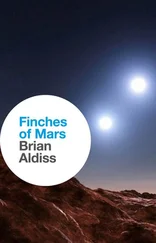Brian Aldiss - White Mars
Здесь есть возможность читать онлайн «Brian Aldiss - White Mars» весь текст электронной книги совершенно бесплатно (целиком полную версию без сокращений). В некоторых случаях можно слушать аудио, скачать через торрент в формате fb2 и присутствует краткое содержание. Год выпуска: 1999, ISBN: 1999, Издательство: Little, Brown UK, Жанр: Фантастика и фэнтези, на английском языке. Описание произведения, (предисловие) а так же отзывы посетителей доступны на портале библиотеки ЛибКат.
- Название:White Mars
- Автор:
- Издательство:Little, Brown UK
- Жанр:
- Год:1999
- ISBN:0-316-85243-0
- Рейтинг книги:5 / 5. Голосов: 1
-
Избранное:Добавить в избранное
- Отзывы:
-
Ваша оценка:
- 100
- 1
- 2
- 3
- 4
- 5
White Mars: краткое содержание, описание и аннотация
Предлагаем к чтению аннотацию, описание, краткое содержание или предисловие (зависит от того, что написал сам автор книги «White Mars»). Если вы не нашли необходимую информацию о книге — напишите в комментариях, мы постараемся отыскать её.
White Mars — читать онлайн бесплатно полную книгу (весь текст) целиком
Ниже представлен текст книги, разбитый по страницам. Система сохранения места последней прочитанной страницы, позволяет с удобством читать онлайн бесплатно книгу «White Mars», без необходимости каждый раз заново искать на чём Вы остановились. Поставьте закладку, и сможете в любой момент перейти на страницу, на которой закончили чтение.
Интервал:
Закладка:
“Then say it,” interposed Grenz Kanli. “You’re pro-abortion.”
“We’re pro-abortion. Yes,” said Belle, adding, “until both men and women learn to control their sexual urges.”
I saw Sharon returning Kissorian’s glance. She gave a sly smile. There, I thought, was another kind of happiness that could not be legislated for. I could not help liking her a little—and envying her at the same time.
Turning from her companion, Ben, Paula at the next table entered the discussion. Belle’s remark about people curbing their sexual urges had made her restless.
“Haven’t you people forgotten about mothers?” she asked. “You know, the people who actually bring forth babies from their goddamn wombs into the world? Since it’s a result of sexual activity, I suppose you’ve forgotten about mothers.”
“We’ve not—” Belle began, but Paula overrode her.
“You don’t need all this bureaucracy if you honour mothers as they should be honoured, treat them properly, favour them in society. Start thinking about actual people rather than legislation.”
“We are thinking about people. We’re thinking about children,” said Belle, sharply. “If you have nothing better to contribute to the discussion, I’d advise you to keep silent.”
“Yes, yes, yes … If anyone doesn’t think your way, they’d better shut up. That’s your way of thinking, isn’t it?”
“I was thinking,” said Belle, coldly, “more of your recent abortion. That is a pretty clear indication of your precious regard for motherhood.”
Paula looked absolutely astounded. Belle turned her back on her and asked me, “How’s Alpha getting on, my dear?”
I could not answer. Paula rose and marched out of the cafe. As she went she clicked her fingers. Ben Borrow stood up, gave us an apologetic glance, and followed Paula.
Only afterwards, when I talked to Kissorian and Sharon about this spat, did I understand the emotions that provoked it. The reason was simple. Belle stepped out of her normal rather magisterial role because she was jealous. Ben Borrow had been her protege. She was furious to see that he had taken up with Paula. He had said nothing. His mere presence was enough to irritate Belle.
I reflected on my ineptness at reading motives.
After more discussion, and more coffdrink, Belle calmed down enough to return to the conversation.
She said, “For some centuries, the civilised nations, so-called, have had health-care services. Time and again, those services failed, in the main through underfunding. The essence of our scheme involves continuity—that an underprivileged child should have a helper to whom he can always turn, who indeed meets up with him over a cup of something once a week.”
“We call this the C S system, and it can run throughout life if necessary,” said Crispin. “C S—Care and Share. Always someone there to share problems and talk to.”
Kissorian laughed. “Isn’t that what husbands and wives do, for heaven’s sake? Your C S is a kind of sexless marriage, isn’t it?”
“No, it’s sexless parenting,” Crispin said sharply.
“I had as difficult a childhood as you can imagine, and I could never have tolerated any stranger’s shoulder to cry on.”
“Just stop and think about that, Kissorian,” Belle said. “Suppose there had been not strangers but a steady friend, always there to turn to…”
“I’d have stolen his wallet!”
“But with our C S system in operation, your childhood would not have been so difficult, and so you would not have felt that compensatory need to steal a wallet. You can’t be glad you had such a difficult childhood?”
He smiled, directing half of that gleam towards Sharon. “Oh yes, I can. Now that it’s over. Because it is an integral part of my life, it formed my character, and I learned from it.”
Silence fell while we digested what had been said.
At length Tom spoke. “You have some concrete proposals, Belle and Crispin. They’re certainly sane and benevolent in intention, although how any terrestrial politicians can be strong enough, enlightened enough—”
Belle interrupted. “We have a singular advantage here, Tom. No politicians!”
“At least, not in the accepted sense,” added Crispin, with a smile.
“We enter this plan into our constitution here, and enact it as far as is possible—in the hope that Earth may take it up later. Example sometimes wins converts.” Belle turned her regard suddenly on me. “And what does our silent and watchful Miss Cang Hai make of all this?”
I saw in her expression ambition and hostility, which were quickly wiped away by a mask of patience; the confusion of human senses is such I remained unsure whether I had read her correctly, or was projecting my own misgivings.
“It’s benevolent but cumbersome to operate,” I told her. “Who would you find willing to take on these burdens of assisting the young, perhaps often in opposition to the natural parents?”
“People are surprisingly willing to assist when they see a worthwhile enterprise. Their lives would also be enriched.” She added firmly, “For a civilised society, there is no other way.”
I paused, wondering if I cared to contradict this forceful woman. “There is another way. The way of medicine. Simple supervision of a child’s hormone levels—oestrogen, testosterone, serotonin—is better than many a sermon.”
As if the thought had just occurred to her, Sharon said, leaping in, “And what if all this well-meaning stuff did not work? What if the kids still offended?”
Without hesitation, Belle Rivers said, “They would be beaten before witnesses. Where kindness fails, punishment must be available.”
Sharon screamed with laughter, displaying the inside of her mouth like a tulip suddenly opening.
“Would that do them good?”
Crispin said, “At least it relieves the frustrated feelings of the teachers…”
“So be it,” Tom said. “Let’s take it to the forum of the people and try to gain support for your plan. We’ll see what our friend Feneloni has to say to it.”
All this while, the days and weeks and months of our lives were eroding away. As we entered on the third year of our isolation on Mars, I had to speak to Tom about the news of Olympus’s accelerated progress towards the science unit.
“I know,” said Tom. “Dreiser told me.” He sat there with his head in his hands and said not another word.
16
My head was extremely bad. I did not attend the discussion when Belle Rivers stood beneath the blazing Hindenburg and argued her case for continuous education. As expected, it was opposed by Feneloni. Cang Hai and Guenz and the others reported the essence of the meeting.
After Belle and Crispin had outlined their plan, there was general applause. Several people rose and affirmed that the upbringing and care of children held the secret of a better society. One of the scientists quoted Socrates as saying that only the considered life was really worth living, and that consideration had to be nurtured in the young to sustain them throughout life.
Feneloni thought differently. The whole Rivers scheme was unworkable, in his opinion, and deserved to be unworkable. It was against human experience. It was wet nursing of the worst order. He became vehement. All living things had to find their own way in life. They succeeded or they failed. Rivers’s plan, in trying to guarantee there were no failures, guaranteed there would be no successes.
Was she not aware, he asked, of the tragic sense of life? All of the world’s great dramas hinged upon error or failure in an otherwise noble or noble-minded person. He cited Sophocles (“already mentioned”), Shakespeare and Ibsen as masters of this art form, which purged us with pity. Tragedy was an integral part of human society, tragedy was necessary, tragedy increased our understanding.
Читать дальшеИнтервал:
Закладка:
Похожие книги на «White Mars»
Представляем Вашему вниманию похожие книги на «White Mars» списком для выбора. Мы отобрали схожую по названию и смыслу литературу в надежде предоставить читателям больше вариантов отыскать новые, интересные, ещё непрочитанные произведения.
Обсуждение, отзывы о книге «White Mars» и просто собственные мнения читателей. Оставьте ваши комментарии, напишите, что Вы думаете о произведении, его смысле или главных героях. Укажите что конкретно понравилось, а что нет, и почему Вы так считаете.










